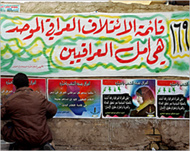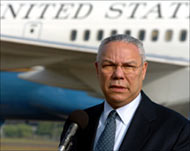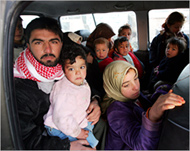US lowers expectations for Iraq vote
Unable to deliver on its goal of bringing democracy to Iraq through the 30 January elections, the US has gone into damage-control mode to lower expectations for the vote.

With fears for a low voter turnout among Sunni Arab Iraqis due to a boycott and intimidation, the administration no longer touts the elections as a catalyst to spread democracy across the Arab world.
Instead, US officials now emphasise the political process that will follow the vote.
“Clearly, we don’t see the election itself as a pivotal point,” Deputy Secretary of State Richard Armitage told NPR on Friday. “It’s the beginning of a process, the process where Iraqis will write a constitution and at the end of the year will actually vote for a permanent government.”
Less than perfect
Almost two years after Operation Iraqi Freedom, violence across mainly Sunni areas forced the White House this week to prepare the American public for elections it called “less than perfect”.
For months, the Bush administration has been steadily lowering expectations over the vote, beginning with Secretary of Defence Donald Rumsfeld in September warning violent areas of the country might be excluded.
 |
|
The US now focuses on the |
And with just two weeks to go, the administration acknowledges that despite military offensives meant to provide security for the vote, the fear of bullets and bombs will keep many Sunnis away from the ballot box.
Rather than ushering in Iraq’s first free and fair national elections for decades, the Bush administration has now limited its ambition for a vote it refuses to postpone.
“I think a successful election will be an election where most of the population has gotten a chance to vote, and even though we may not get the same kind of numbers in the Sunni area, we’re going to have to go forward and use the results of this election to build on,” Secretary of State Colin Powell told PBS.
Worsening violence
Powell has lobbied the Shia to include disenfranchised Sunnis in the government in the likely event that they overwhelmingly win the vote.
 |
|
Powell acknowledges that the |
But the top US diplomat acknowledged such manoeuvring also risked inflaming the violence.
“The insurgency is not going away as a result of this election. In fact, perhaps, the insurgents might become more emboldened,” Powell said.
Critics of the administration’s Iraq policy complain the elections for a 275-member assembly that should draw up a constitution and pick a transitional government are so flawed they will be illegitimate – and counterproductive for democracy in the region.
Discrediting democracy
“These elections are a joke,” said Juan Cole, a professor of modern Middle East history at the University of Michigan.
“The Bush administration has created the worst possible advertisement for democracy because the perception across the Middle East is that democracy means you get a country where everything is out of control,” he said.
 |
|
Critics say Iraq gives democracy |
Before the vote, the administration “has definitely gone into damage-control mode”, Stephen Zunes, a politics professor at the University of San Francisco said.
“Once their original rationale [to rid Iraq of weapons of mass destruction] fell apart, they created very high expectations for democracy to be able to justify their takeover,” he said.
“Now that they have ended up with a not particularly good demonstration of democracy, they are forced to lower the public’s expectations for these elections.”
Vietnam mirror
By coincidence, Iraq’s 30 January elections fall on the 37th anniversary of the Tet offensive, the Vietnam war turning point that could hold lessons for Iraqi fighters and US policy makers.
“The fundamental lesson of the Tet offensive is not the immediacy of the event, but it is about the political will of the United States, and how you grind at that and you never let up on that, never lose focus on it,” said marine Colonel Thomas Hammes, a leading military expert on insurgencies.
“The overall goal is pretty much the same. The United States is a distant intervening power. They [insurgents] are fighting on home turf. And they believe they can outlast the United States, and that ultimately the American people will tire of that mission, particularly if they can inflict enough casualties,” said Cato Institute defence analyst Ted Carpenter.